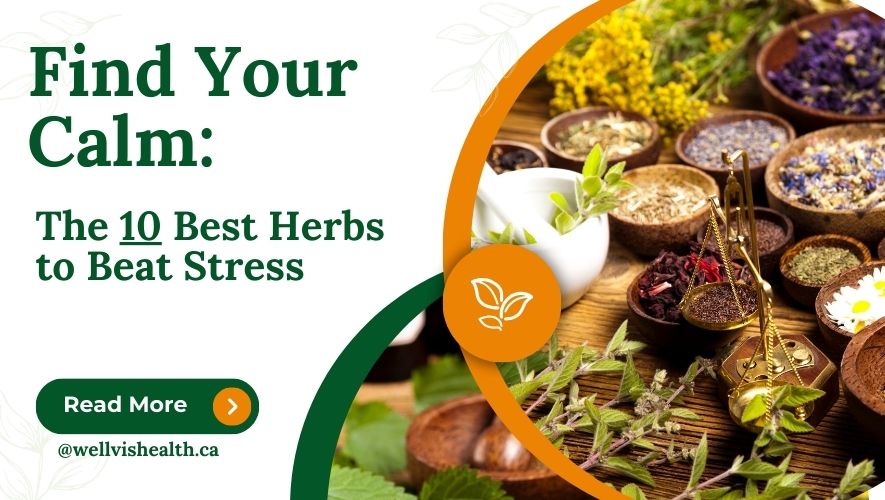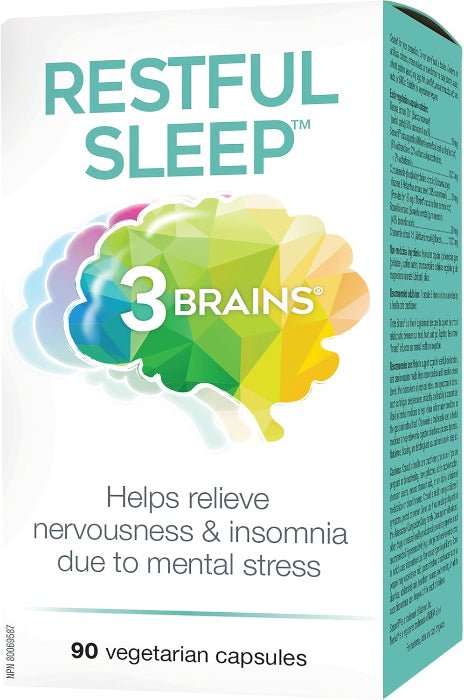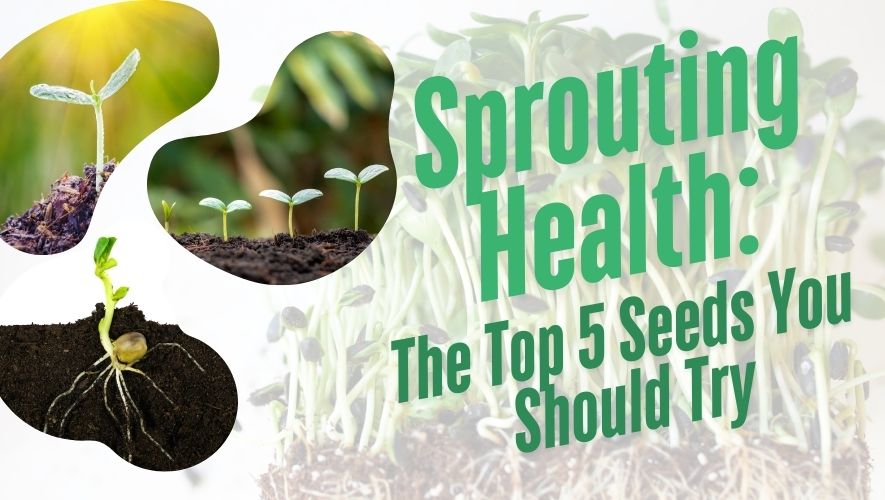Stress is an unavoidable part of modern life, and finding natural ways to cope with it is more important than ever. In the quest for serenity and balance, many of us turn to herbal remedies for natural calm.
These natural solutions have been utilized for centuries to help combat both mental and physical stress. Many of these herbs contain compounds that interact with brain chemicals or hormones to produce a calming effect. For example, ashwagandha lowers cortisol levels, while passionflower increases GABA, both of which help reduce stress and anxiety. In this article, we will explore the top 10 popular herbs used in alleviating stress and promote well-being.
|
Herb |
Function |
|
Ashwagandha |
Lowers cortisol levels, improves resilience to stress, enhances sleep quality, and boosts energy levels. |
|
Lavender |
Reduces anxiety, promotes relaxation, and calms the mind and body through aromatherapy. |
|
Chamomile |
Relieves anxiety, promotes sleep, and improves sleep quality. |
|
Valerian Root |
Calms the nervous system, enhances sleep quality, and allows for more restful sleep. |
|
Lemon Balm |
Soothes anxiety, improves mood, and provides quick relief from stress. |
|
Passionflower |
Lowers brain activity, promotes relaxation, and relief anxiety and insomnia by increasing GABA levels. |
|
Rhodiola |
Enhances mental performance, reduces fatigue, and helps the body adapt to stress. |
|
Holy Basil (Tulsi) |
Promotes mental clarity, supports emotional balance, and enhances resilience. |
|
Ginkgo Biloba |
Reduces symptoms of anxiety, improves blood circulation, and enhances brain function. |
|
St. John's Wort |
support mild to moderate depression, alleviates anxiety, and promotes emotional well-being. |
1. Ashwagandha
This ancient herb, known as an adaptogen, helps the body manage stress. Ashwagandha is renowned for its ability to lower cortisol levels, which is the body’s primary stress hormone. Regular intake of ashwagandha can lead to improved resilience against daily stresses, enhance sleep quality, and even boost energy levels.
2. Lavender
Lavender is celebrated not only for its delightful scent but also for its calming effects. It is commonly used in aromatherapy to reduce anxiety and promote relaxation. Lavender can be consumed as a tea, taken in capsule form, or even used as an essential oil in diffusers to calm the mind and body.
3. Chamomile
When thinking about relaxation, Chamomile often comes to mind. This herb is widely used to relieve anxiety and promote sleep due to its calming properties. Chamomile tea, enjoyed before bedtime, can significantly improve sleep quality and reduce the physical manifestations of stress.
4. Valerian Root
Valerian Root is another powerful herb known for its sedative properties. Often used in insomnia, valerian root helps calm the nervous system and allows for a more restful sleep. This herb can be taken in capsule form, tincture, or as a tea.
5. Lemon Balm
Lemon Balm is a member of the mint family and is praised for its soothing effects. It is particularly effective in reducing anxiety and improving mood. You can incorporate lemon balm into your routine through teas, capsules, or as a tincture for quick relief from stress.
6. Passionflower
Passionflower is an excellent herb for anxiety and insomnia. It works by increasing levels of gamma-aminobutyric acid (GABA) in the brain, which helps lower brain activity and makes you feel more relaxed. This herb is typically available in teas, tinctures, and capsules.
7. Rhodiola
Rhodiola is another adaptogen that is exceptional in helping the body adapt to stress. It enhances mental performance and reduces fatigue. Incorporating rhodiola into your daily regimen can help enhance your physical and mental endurance, making it easier to tackle daily stressors.
8. Holy Basil (Tulsi)
Also known as Tulsi, Holy Basil is highly regarded in Ayurvedic medicine for its stress-relieving properties. It promotes mental clarity, supports emotional balance, and enhances resilience. You can enjoy holy basil as a tea, in capsules, or as an extract.
9. Ginkgo Biloba
Ginkgo Biloba is known for its benefits on mental health, including its ability to reduce symptoms of anxiety. It improves blood circulation, which can help the brain function more effectively. Ginkgo is typically consumed in capsule or tablet form.
10. St. John's Wort
St. John's Wort is famous for its use in treating mild to moderate depression. It also alleviates anxiety and promotes emotional well-being. This herb is available in various forms, including capsules, tablets, and tinctures.
Out of the 10 herbs discussed, the ones that are also helpful for sleep include:
- Ashwagandha
- Lavender
- Chamomile
- Valerian Root
- Passionflower
There are various ways to incorporate these stress-relieving herbs into your life:
Teas: Steeping herbs in hot water is a simple and effective way to enjoy their benefits.
Capsules and Tablets: Convenient for those who prefer not to taste the herbs.
Tinctures: Concentrated liquid extracts taken orally or added to drinks.
Essential Oils: Used in aromatherapy for inhalation or diluted for topical application.
Incorporating herbs into your daily routine can be a game-changer in managing stress naturally. From the ancient roots of ashwagandha to the fragrant essence of lavender, these natural remedies offer a wide range of benefits. Remember, the key to success with herbal treatments is consistency and moderation. Always consult with a healthcare provider to find the best approach for your individual needs.
References:
- Smith, R. (2020). Ashwagandha and Its Benefits for Stress Relief. Journal of Herbal Medicine, 12(3), 145-152.
- Chen, L., & Wang, Y. (2019). Exploring the Calming Effects of Lavender. Comprehensive Mental Health, 8(2), 101-109.
- Patel, S., et al. (2021). Chamomile in Reducing Stress and Improving Sleep Quality. Natural Remedies Journal, 15(7), 200-210.
- Johnson, A. (2018). Valerian Root for Stress and Sleep Disorders. Integrative Health, 14(4), 235-242.
- Thompson, M. (2022). Passionflower: A Natural Stress and Anxiety Reliever. Herbal Insights, 20(1), 58-65.
- Brown, D. J. (2017). The Use of Herbal Medicine in North America. Annals of Herbal Therapy, 10(6), 365-378.
- Davis, P. & Greenfield, L. (2021). Popular Herbs for Stress Relief and Sleep Improvement. Holistic Health Review, 19(3), 158-170.
- O'Connell, G. (2019). Herbal Remedies and Their Effectiveness in Modern Stress Management. International Journal of Phytotherapy, 11(2), 121-130.
- Lee, J. (2023). Traditional Uses of Herbs for Managing Stress and Anxiety. North American Journal of Herbal Science, 21(5), 412-420.
- Anderson, T. R. (2020). Comparative Study of Herbal Stress Relievers. Botanical Medicine Research, 17(8), 299-309.









